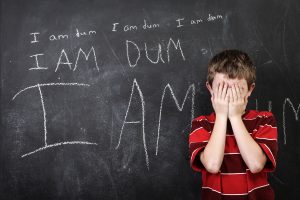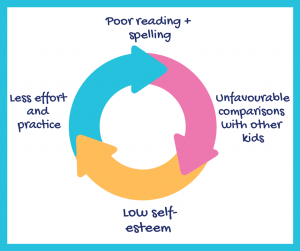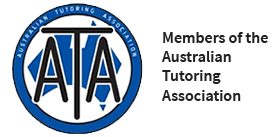Through our dyslexia tutoring at Learning Works Geelong, we see many children who have low self esteem.
Children with specific learning disorders, like dyslexia and learning disabilities have spent many years at school feeling “stupid.” Their self esteem is at an all time low.

We see many children for dyslexia tutoring at Learning Works who do not value themselves, believe they are capable or feel important.
From a young age, children compare themselves to their peers in social areas, like their ability to make friends, their sporting talents and their skills in the classroom.
Children with learning difficulties and disorders are particularly at risk for developing low self-esteem. Consistently receiving bad grades, not “getting” the content in class and finding school work really tough, can have dire consequences for your child’s self confidence and self-belief.
There is a general agreement that children with special needs have lower self-esteem and self-concept than those without learning difficulties. Their academic achievement is generally lower and children with learning difficulties are less likely to have been accepted by their peer group and are sometimes bullied. Around half of all children we see through our dyslexia tutoring Geelong services have been teased and many have had experiences with teachers who are ignorant of, and who do not acknowledge the existence of dyslexia.
Vicious Cycle
Many children with learning disorders have been struggling in school without adequate interventions for many years before they are formally diagnosed or something is done. A diagnosis for a specific learning disability is typically made when there is a significant gap between the child’s IQ score and their results in a specific area. Therefore, a child with a specific learning disorder or difficulty has put up with many years of feeling inadequate, labelling themselves internally as “slow” or “dumb.”
Children we see for dyslexia tutoring at Learning Works feel “disappointed, frustrated, fed up, ashamed, depressed, angry and embarrassed,” by their difficulties. They question what the point of trying is when they find everything takes them much longer to grasp.
After many years of schooling where their hard efforts have not been recognised, a child with a specific learning disorder many fall into a trap of learned helplessness, developing an attitude that they shouldn’t bother trying anymore, because they always fail.

Your child with a specific learning disorder will likely feel confused, discouraged and worn down by the demands of school and their inability to “get it,” and understand aspects of learning like other children.
For some children, it is easy to see how they get into a vicious cycle where they give up trying with literacy skills because they haven’t had success, widening the gap between their school performance and the performance of others in their class.
The toll of low self-esteem
Children with low-self esteem, will not advocate for themselves and their learning needs properly. They may have trouble gaining the confidence they need to face their specific learning disorder.
Low self-esteem is also at the root of other concerning problems. The “secondary” symptoms of dyslexia and other specific learning disorders can lead to mental health problems, like anxiety and depression in children and a lot of acting out at school as a coping mechanism.
- Repeated failure can lead to feelings of anger, severe anxiety and sadness
- Children with low self-esteem can lose interest in learning and school
- Friendships can suffer as frustrated kids seek attention – even if it is negative. Children with low self esteem in certain areas (such as reading) are at a higher risk for disruptive behaviour such as conduct problems and hyperactivity in the classroom
- Many children with low self-esteem develop poor coping methods to deal with the challenges they face everyday – like quitting tasks and avoiding school.

Dyslexia has been associated with depression, anxiety, lower self-esteem, attention deficits and often, behavioural problems.
Labelling
After a diagnosis, many children we work with for dyslexia tutoring at Learning Works feel relief, as they now have an understanding about why their child found learning in certain areas so challenging. Some children and families however, have the opposite reaction and feel more stigmatised and see themselves in a more negative light after a diagnosis and label is given.
Learning Works sees children for dyslexia tutoring who blame themselves
Attributions are the reasons or explanations your child will give for their performance or the performance of someone else. Children who have learning difficulties are more likely to view any success they have as a result of luck and to attribute failure to a permanent problem within themselves. In other words they blame themselves for any failures. This can set up a feeling where children think there is nothing they can do that can change the situation so they give up trying at all.
The basic issue for teachers and parents of dyslexic children is to break this circle and start to change a child’s behaviour and experiences. Our job is to help these children see themselves more realistically, to raise their self esteem and self-belief in themselves. It is important to give verbal or written feedback in a way that attributes success to internal controllable factors such as the effort or imagination that a child has put into a piece of work.
Learning Works dyslexia tutoring can enhance self-esteem in children with dyslexia
The question is how can teachers and parents change a dyslexic child’s view of themselves and make a difference to change their life?
Children with dyslexia and other specific learning disorders often lack the hope that the future will be any better that the present. They feel they’re the only one with the problem. Our aim with dyslexia tutoring at Learning Works is to be the one person who stood by a struggling child, believed in them, and gave them the strength and courage to keep trying.
Speak to your child’s teacher about creating a friendly learning environment for your child

There are many benefits of increasing teachers’ knowledge of the social side of school.
- Every child needs to feel competent – why would a child want to go to school if the teachers only focused on what he didn’t do well? Talk to your child’s teacher about their specific learning disorder and self-esteem issues.
- Make sure your child feels safe at school and secure in their classroom and in their teacher’s presence.
- Ensure there is good communication between your child’s teacher and yourself.
- Use multi-sensory learning techniques at home so the dyslexic child can learn more efficiently.
Encourage your child’s interests
Find your child’s area of strengths. Figure out how your can use your child’s strengths to increase his or her feelings of competence.
 Finding an activity they enjoy and that they are good at can help your child discover their strengths and keep their academic struggles in perspective. If you child is a gun at football or likes gymnastics or even computer coding, encourage them to pursue that so they can bolster their self-confidence in other non-academic avenues.
Finding an activity they enjoy and that they are good at can help your child discover their strengths and keep their academic struggles in perspective. If you child is a gun at football or likes gymnastics or even computer coding, encourage them to pursue that so they can bolster their self-confidence in other non-academic avenues.
Praise your child’s approach and efforts—not just the end result.
Find something praiseworthy in your child – Be generous with your praise. Rather than just focusing on the outcome – praise the hard work that your child put into their work. Acknowledge the way your child tackled challenges – this teaches them that they’re capable of overcoming obstacles.
Find ways to praise your child for working hard on their school work and for the effort they are showing. Even if they are significantly below their peers – they are trying. That attitude is something you want to foster in your child.
Find examples of successful people with specific learning disorders
Knowing there are successful people, including athletes, celebrities and entrepreneurs with learning and attention issues who faced similar struggles can also be a source of inspiration. For example, actor Daniel Radcliffe has said that doing stunt work for the Harry Potter movies helped him overcome some of his struggles with dyspraxia.
Key takeaways
Helping your child develop positive self-esteem is possible. Being supportive, encouraging your child to have interests outside of school and being involved in your child’s learning are all ways to improve their skills.
No child will change until the adults in their lives have the courage to change – how we interact with them, and how we teach them. Contact us about our dyslexia tutoring at Learning Works to see how we can help your child today.
_______________________________________________________________________________________
References:
- Mark E. Boyes, Bree Tebbutt, Kathryn A. Preece and Nicholas A. Badcock, Relationships between Reading Ability and Child Mental Health: Moderating Effects of Self‐Esteem, Australian Psychologist, 53, 2, (125-133), (2017).Wiley Online Library
- Emily M. Livingston, Linda S. Siegel and Urs Ribary, Developmental dyslexia: emotional impact and consequences, Australian Journal of Learning Difficulties, 10.1080/19404158.2018.1479975, 23, 2, (107-135), (2018).
- Tiina Turunen, Elisa Poskiparta and Christina Salmivalli, Are reading difficulties associated with bullying involvement?, Learning and Instruction,10.1016/j.learninstruc.2017.05.007, 52, (130-138), (2017).
- JONATHAN GLAZZARD, The impact of dyslexia on pupils’ self-esteem, Support for Learning, 25, 2, (63), (2010).

